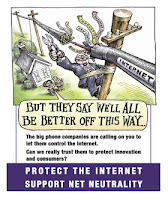 Atlantic Records, et al., brought suit against Christopher Brennan just over a year ago. Brennan failed to respond to the complaint, never appearing in court to answer the copyright infringement charges. After an entry of default was entered on August 6, 2007, the RIAA moved the court for a default judgment, which Judge Janet Bond Arterton denied in a ruling earlier this month.
Atlantic Records, et al., brought suit against Christopher Brennan just over a year ago. Brennan failed to respond to the complaint, never appearing in court to answer the copyright infringement charges. After an entry of default was entered on August 6, 2007, the RIAA moved the court for a default judgment, which Judge Janet Bond Arterton denied in a ruling earlier this month.In order to obtain a default judgment, three factors have to be satisfied. First, the default needs to be willful. In so many words, the default has to arise out of the inexcusable neglect of the defendant. Second, there cannot be a "meritorious defense" available to the defendant—a defense that is sufficient, "even if not 'ultimately persuasive.'" Last, the plaintiffs need to be prejudiced if the default is not granted.
The judge had harsh words for the RIAA's argument that making files available on KaZaA equates to copyright infringement. "At least one aspect of Plaintiffs’' distribution claim is problematic, however, namely the allegation of infringement based on 'making the Copyrighted Recordings available for distribution to others."
RIAA fails again to get default judgment in uncontested case
The RIAA has once again been admonished in Federal court for trying to present vague "evidence" to support their claims of infringement. The judge in this case also left the door open to once again leave questions about the constitutionality of the excessive awards demanded in these cases while offering no proof of actual damages. It's not an unreasonable request to have the plaintiff in any litigation to prove the damages actually incurred. The mere act of "making available" as opposed to actual distribution of copyrighted files has been the lynchpin of the RIAA arguments in many cases. It's refreshing to have yet another judge in the federal court system question the merits of this ridiculous argument. If one thinks about it logically, how can you ask for a judgement well in excess of any real damages when you offer no proof the actual act of sharing ever occurred?
The judge in this case also admonished the RIAA for using a "boilerplate" complaint that was vague in it's details. The RIAA afterward, said they would be filing a brief to further clarify their position as they had done in other cases. This legal maneuver is an attempt by RIAA attorneys to give as little information as possible to the court in the hopes that they will get a judgement without ever presenting their flimsy evidence for further scrutiny. One would think that the courts will tire of this shady practice and continue to dismiss their claims as unsubstantiated. It would also be prudent for the court to deny acceptance of any brief filed after the fact. Watch closely to this case as it appears that it may end in another defeat for the RIAA and bring us one step closer to the end of these ridiculous lawsuits and awards.










